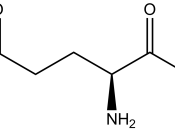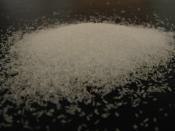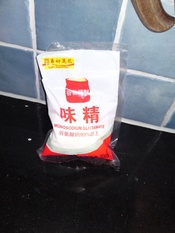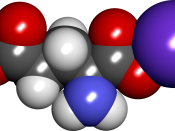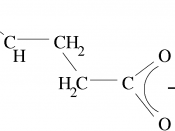)Whenever I think about which food is good for my baby, and whenever I wonder about my mother's health - still in Vietnam and far away from my care - I want to learn as much about healthy food as possible. One of the things I've learned is that Asian restaurants commonly use MSG as a food additive, but most people are not aware of the detrimental effects of MSG. People possibly have not realized why hundreds of thousands of people feel ill every year after consuming MSG. Many studies have been done that show how MSG harms people's health.
MSG stands for "monosodium glutamate," a white crystalline powder that rapidly dissolves in water and is used as a food additive and flavor enhancer. According to Lynn Stration's article "Want Full Disclosure With That Meal" from the St. Petersburg Times website , MSG was first made in 1908 by Dr.
Kikunae Ikeda in Japan. Dr. Ikeda isolated the compound from Japanese seaweed and sold it as a new flavor enhancer. Pursuant to Julia Moskin's article" Yes, MSG, the Secret Behind the Savor" from the New York Times website, Americans discovered it during the Second World War and mass-marketed it without testing its safety (1). It became very popular and is now used every day in homes and restaurants in all kinds of foods. For example, according to Devananda Tandavan, from the Hinduism Today, wrote in the article "MSG - A Hidden Hazard" that scientists estimate that MSG usage has doubled every decade and now hundreds of tons of MSG are added to food each year in canned soups, frozen dinners, frozen seafood, most fast foods, instant noodles, and used heavily in many Asian restaurants (1). Also it is a popular food additive in such foods as: stocks, spices, seasonings, bouillon, salad dressings, processed meats, crackers, etc (Stration 1).
MSG works as a neurotransmitter allowing communication between neurons and cells in brain. According to Dawn Copeman's article "MSG" from the Healthdangers.com website, when we eat MSG in foods, the body cannot pump out the excess, and the neurons can become over-stimulated and die (1). Thus it can cause major problems in people's health. Pursuant to Michelle Meadows's "MSG: A Common Flavor Enhancer," from the EBSCO website, the FDA's report in 1995 affirmed that MSG symptoms include burning sensation in the back of the neck, forearms and chest, numbness in the back of the neck radiating to the arms and back, tingling, warmth and weakness in the face, temples, upper back, neck and arms, facial pressure or tightness, chest pain, migraines, nausea, rapid heartbeat, drowsiness, and sweating (2). One account was given in Patricia Taliaferro "MSG and Chinese Restaurant Syndrome" from the Journal of Environmental Health found in the EBSCO website: A man experienced numbness in the back of the neck, gradually radiating to both arms and the back, general weakness and palpitations after he had eaten in a Chinese restaurant (1). Another account was in Deas Gerald's "A Fast Headache From Fast Foods" from the EBSCO website: A woman suffered headaches for years and sometimes associated with nausea after she had had Chinese fast foods (1). Obesity is an additional health problem caused by MSG. Pursuant to the article "Glutamate Acid (Flavor)" from the Wikipedia website, researchers demonstrated a relationship between glutamate intake and serum levels of growth hormone, combined with an epidemiological survey of 2,239,96 German adults which compelled some researchers to theorize (2006) that monosodium glutamate has a role in the occurrence of obesity in humans (5). Another serious effect of MSG is the occurrence of brain lesions. Based on Daniel Raiten's "Executive Summary: MSG" from the Journal of Nutrition, found in the Proquest website, it has been shown to damage the parts of the brain unprotected by the blood-brain barrier, and a variety of chronic diseases can arise out of this neurotoxicity. The effects are especially noted in the hypothalamus and temporal lobes of the brain which function in controlling emotions, immunity, the sleep cycle, hormones, puberty and short-term memory, to name a few . Furthermore, research dating as far back as 1987 has shown that MSG leads to serious brain lesions in children. These lesions caused impairment in cognitive skills, endocrinological problems, learning difficulties, and emotional abnormalities. It further caused other diseases in children such as asthma attacks, shortness of breath, runny nose, rash, flushing, mouth lesions, diarrhea, stomach cramps, irritable bowel syndrome, and nausea (2-5). Richard Pressinger, a medical researcher from University of South Florida, related in "MSG and Aspartame During Pregnancy," how Dr. Lehner of Harvard Medical School had removed MSG from the diet of a 6-month-old infant, and the result was that it alleviated the infant's seizures (2).
Because of the health problems, many American citizens petitioned the FDA to list MSG as an ingredient on food labels. Because free glutamate in forms other than monosodium glutamate is present also in many other additives, the FDA proposed adding the phrase "contains glutamate" instead of "No MSG" or 'No Added MSG." Also the petition requests warning labels that MSG may be harmful to certain groups of people. It should be similar to the warning label for aspartame, the artificial sweetener. However, the FDA still has not implemented the requests of the petition (Glutamic Acid 6).
In conclusion, the widely popular MSG, present in most fast foods and Asian restaurants, has been shown to be a health danger. MSG is a type of neurotransmitter that in excess can cause many health problems. Especially in children, it can cause serious brain lesions leading to cognitive impairment and emotional disorders. It makes sense that adults should not feed their babies any kinds of food with MSG. Because of the health dangers, the FDA has been petitioned to put warning labels on foods with glutamates. In fact, the FDA should act responsibly and ban MSG altogether. We don't have to wait for government to act though, we can avoid buying products with MSG and Asian restaurant owners can stop using MSG. In the other words, now that we know that it is bad for us, we should stop using it and live a healthier life.
Works CitedCopeman, Dawn. "MSG." Healthdangers.com. 2005. Healthdangers Group. August 26, 2008. Deas, Gerald. "A Fast Headache From Fast Foods." New York Amsterdam News. 98.21 (2007): 33. Ebsco. Info Trac. TrumanCollege Lib. Chicago, IL . 16 September 2008. "Glutamic Acid (Falvor)." Wikipedia.org. 2008. Wikimedia Foundation, Inc. 26 August, 2008. Meadows, Michelle. "MSG: A Common Flavor Enhancer." FDA Consumer. 37.1 (2003):34. Ebsco. Info Trac. TrumanCollege Lib. Chicago, IL . 16 September 2008.
http://0-web.ebscohost.com.colib.ccc.eduMoskin, Julia. "Yes, MSG, the Secret Behind the Savor." Nytimes.com. 2008. The New York Times. August 28, 2008. Pressinger, Richard. "MSG and Aspartame During Pregnancy." Chem-tox.com. 1997. University of South Florida. 28 August 2008.
Raiten, Daniel, John Talbot, and Kenneth Fisher. "Executive Summary From The Report: Analysis of Adverse Reactions to MSG." The Journal of Nutrition. 125.11 (Nov. 1995): 28. Proquest. Info Trac. TrumanCollege Lib. Chicago, IL. 18 Sept., 2008. Stration, Lynn. "Want Full Disclosure With That Meal.?" St. Petersburg Times. 2005. St. Petersburg Times. August 28, 2008. Taliaferro, Patricia. "MSG and The Chinese Restaurant Syndrome." Jounral of Environmental Health. 57. 10 (June '95): 8. Ebsco. Info Trac. TrumanCollege Lib. Chicago, IL . 16 September 2008. Tandavan, Devananda. "MSG- A Hidden Hazrd." Hinduism Today. 14. 12 (Dec. 31, '92): 7. Proquest. Info Trac. TrumanCollege Lib. Chicago, IL. 18 Sept., 2008.

